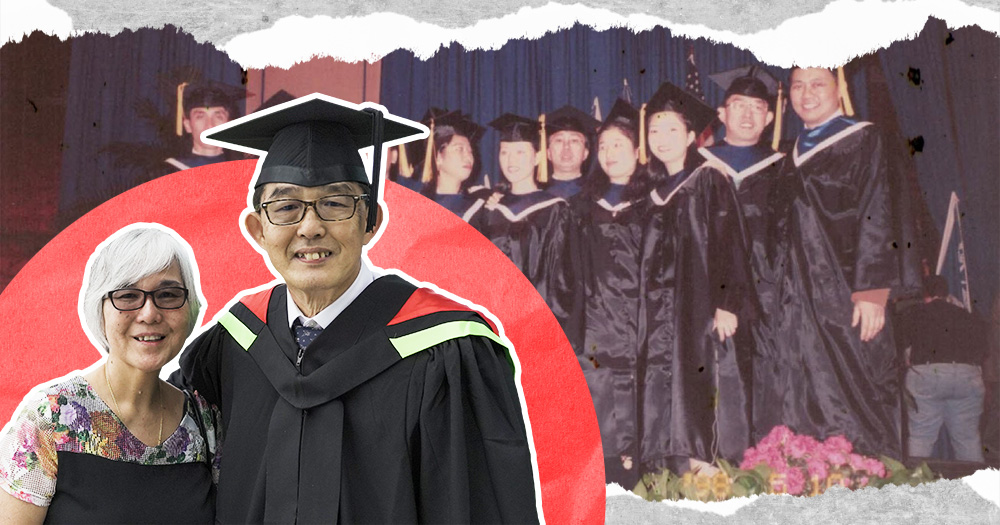Follow us on Telegram for the latest updates: https://t.me/mothershipsg
Every now and then, I come across an Instagram post from an ex-classmate, waxing nostalgic about the good ol' days of uni.
Wistful musings about going back to school have also become a pretty common refrain among us gainfully-employed twentysomethings.
Personally, I'm happy to let uni stay a rose-tinted memory. After all, going back to school also means going back to a life of 8am classes, module bidding wars, and endless groupmate politicking.
Along with some fun new additions you get as a mature student. There's the apprehension of committing years of your life (and thousands of your hard-earned dollars) to something that may or may not work out. Plus the fear of struggling to catch up, having been out of the system for so long — something I feel already, even as a fairly recent graduate.
And of course, the quiet paiseh-ness of being older than your peers.
But not for Chong Wan Min. It was in 2017 when he woke up one morning, came across an ad in the newspaper, and thought to himself — in a manner typical of him, as I would later find — why not?
Cut to a few months and a number of Google searches later, he walked into class at the Singapore University of Social Sciences as a newly-inducted student in the Bachelor of Science (Human Factors in Safety) programme.
Fresh from a five-week solo hitchhiking jaunt across Europe, Chong was the very picture of an adventurous, youthful, gutsy spirit.
And all of this just two months before his 61st birthday.
 Making a stop in Berlin. Photo courtesy of Chong Wan Min.
Making a stop in Berlin. Photo courtesy of Chong Wan Min.
Gruelling schedule
Contrary to how he might seem, Chong is neither reckless nor foolhardy.
Now 66, he exudes a kind of good-natured, old-school sensibility. Going back to school, he admits, was far more demanding than he’d expected; being more of a “technical” person, he struggled with lectures and tutorials on top of his full-time job.
“I spent a lot of time [on my studies]. Even my leave all go to studies, exam, or revision,” he says. “So when I study halfway, I thought of giving up halfway also… I thought I cannot make it.”
“Then I think, 'aiyah, I work hard lah.'”
His schedule was undeniably gruelling. Work would start at 8:30am, and it was straight into action — as a safety officer, Chong spends his day driving to different sites in Singapore to conduct inspections.
During lunch, instead of engaging in idle chitchat or watching videos on his phone, he'd pull out his notes and tackle a few practice questions. On a typical day, he could squeeze in about three hours of self-study — and that’s excluding the twice-weekly lectures he attended after work.
That's a pretty astonishing amount of discipline. Honestly, I'm not sure if I managed to get three hours of study a week back in uni (excepting frantic pre-exam cram sessions, obviously).
There were other sacrifices too. With all his leave spent on exams, Chong hasn’t had a real holiday since that hitchhiking trip to Europe.
His dedication to his studies also means less time to spend with the family, he tells me. I ask him to elaborate, and he says, after a second’s pause:
“Sometimes my wife ask me to go out, I say no lah, I don’t have time. I got to do my assignment.
I sacrificed for nearly five years."
Failing a module twice
Although his relentless self-discipline kept him ahead of the curve for most classes, Chong was hit by a roadblock towards the tail end of his course: a compulsory statistics module.
“My maths no good,” he admits. “Although I study very hard, but the questions that come out, I don’t understand.”
“I fail the first exam, then I retake. Then second exam I retake again.”
Eventually, a few of his friends decided to give up on the class. Being a core module, dropping it meant dropping out of the degree programme — a step which Chong refused to take himself.
Instead, he redoubled his efforts. He’d listen to recorded lectures again and again, and trawl YouTube for explanations. He'd even ask his daughter to check through his work, adds his wife.
“I see him every night sitting there [working],” she recalls. “Very tough lah, not easy.”
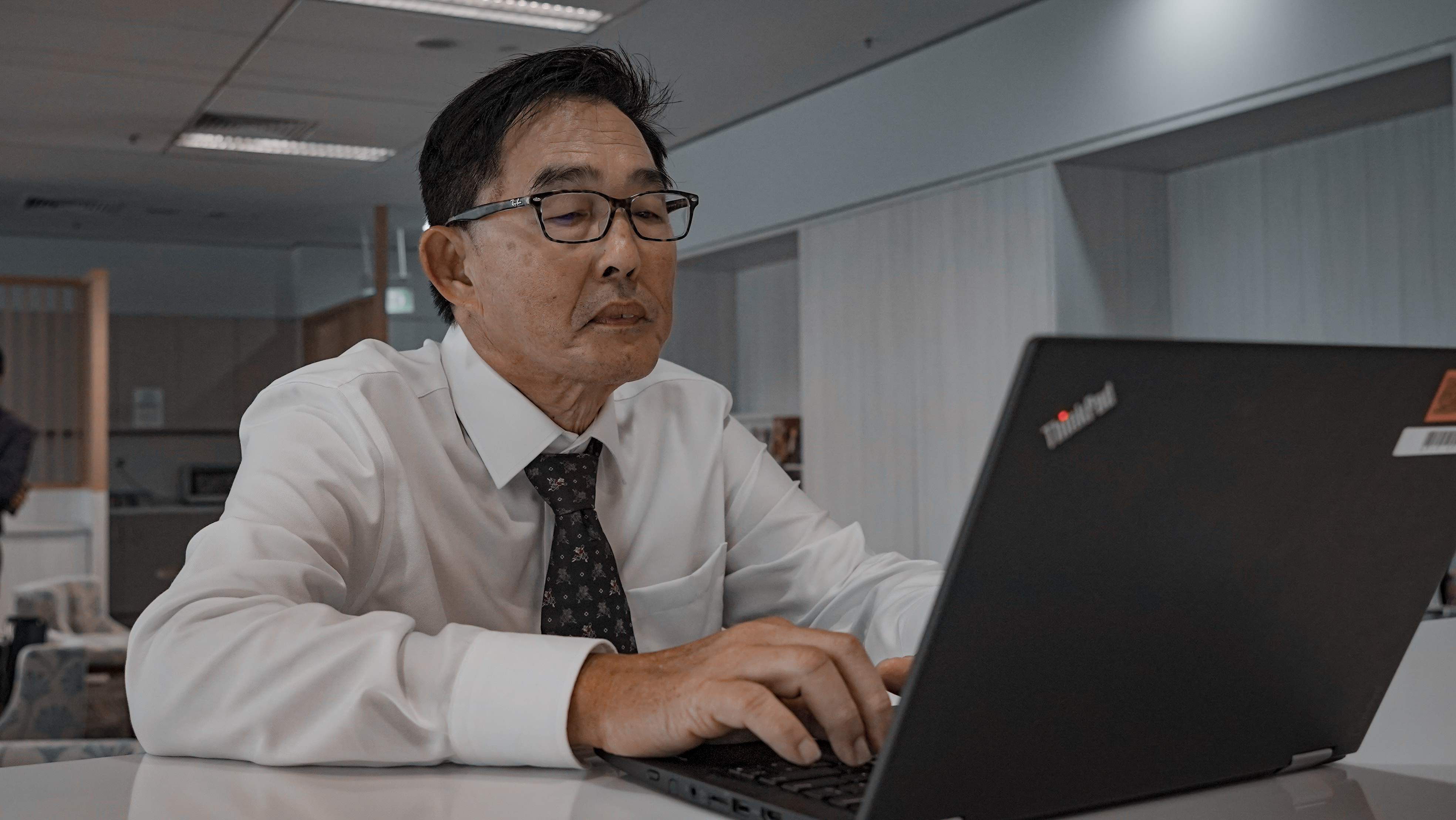 Photo by Ilyda Chua
Photo by Ilyda Chua
But what if you failed the exam a third time? I ask him. Would you give up then?
He shakes his head.
“I say, 'I can make it lah'. I study hard, understand what I did wrong. I worked hard — every day I do a bit, a bit, a bit,” he says.
“Everyday I make myself say, eh, I have to practise a few sums — practise until I understand.”
His efforts paid off. The third time Chong took the exam, he passed.
And on Oct. 5, he successfully graduated, at 66, the oldest student in his cohort.
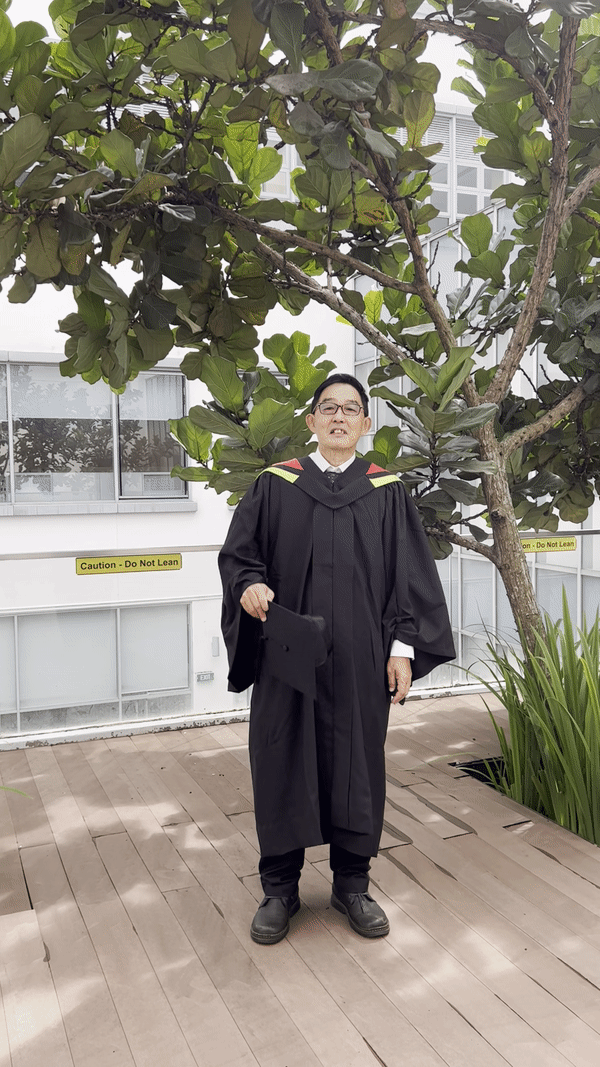
Work until die?
I muster up the nerve to ask him about the potentially sensitive topic of retirement.
Is it something on your radar, I ask, especially since you have a daughter who could help support you?
It's with a slightly dry air that Chong acknowledges: “My daughter got say, 'eh, you can retire.'"
“But I say 'no lah.' Retire, what can you do? When you work it’s something like exercise. If you retire, every day sit at home and stare at the wall…worse you know. You might die earlier,” he adds, only half-joking.
“No, you must make yourself useful. Otherwise it's a waste of knowledge."
This isn’t Chong’s first foray into further education. A staunch believer in lifelong learning, he’d previously completed two other courses as a working adult: a specialist diploma in 2009 and a degree in 1998.
His last educational venture in 2009 saw him switch from working in production to the more stable field of safety, which he says has better, more long-term prospects.
And now, with his latest qualification, he hopes to stave off retirement by a few more years.
For instance, he intends to expand his scope of work into doing safety audits, something he wasn't qualified to do previously.
He also plans to put into practice his newfound knowledge about the psychology behind accidents.
“Then can be more employable,” he says. “Because more people want [workers] who have knowledge and experience… [In safety], even when you’re at the age of 60, 70, still people require you.”
Whereas in his previous field — “you work over 50, 60. Nobody wants you.”
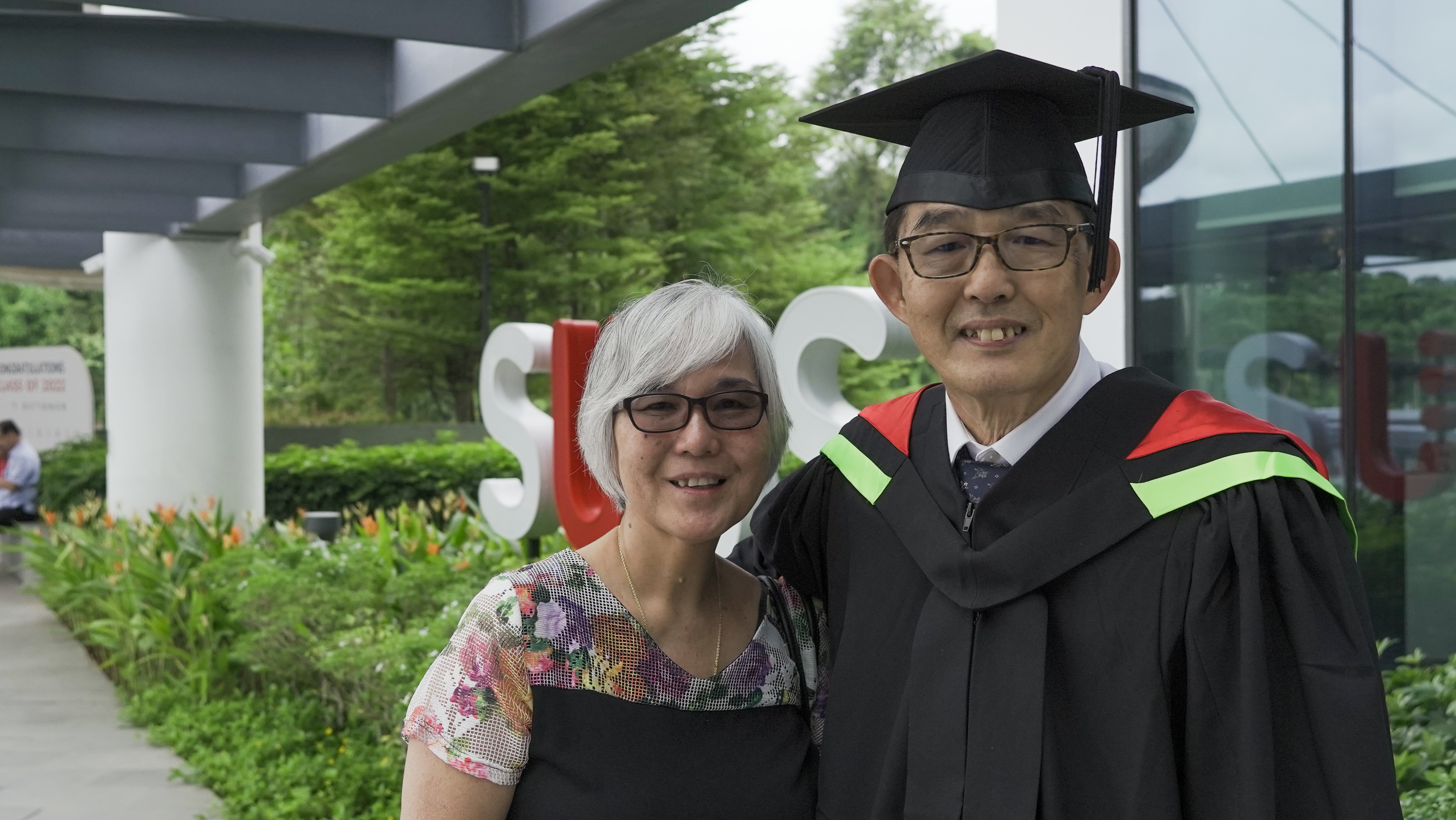 Photo by Ilyda Chua
Photo by Ilyda Chua
Ultimately, Chong, like anybody else, just wants to be useful.
The way he does that is through his work. And despite the practical comforts that society expects him to indulge in at his age — that’s just not who he is.
As such, his goals are simple but ambitious: to work as long as he can, and to spread the message of safety as far as it’ll go.
“I would like to help those companies that are very poor in safety, to prevent accidents, through my experience and knowledge," he summarises, adding that he has not ruled out attending even more courses in future.
“I wish to contribute, through my experience and knowledge… to benefit society.”
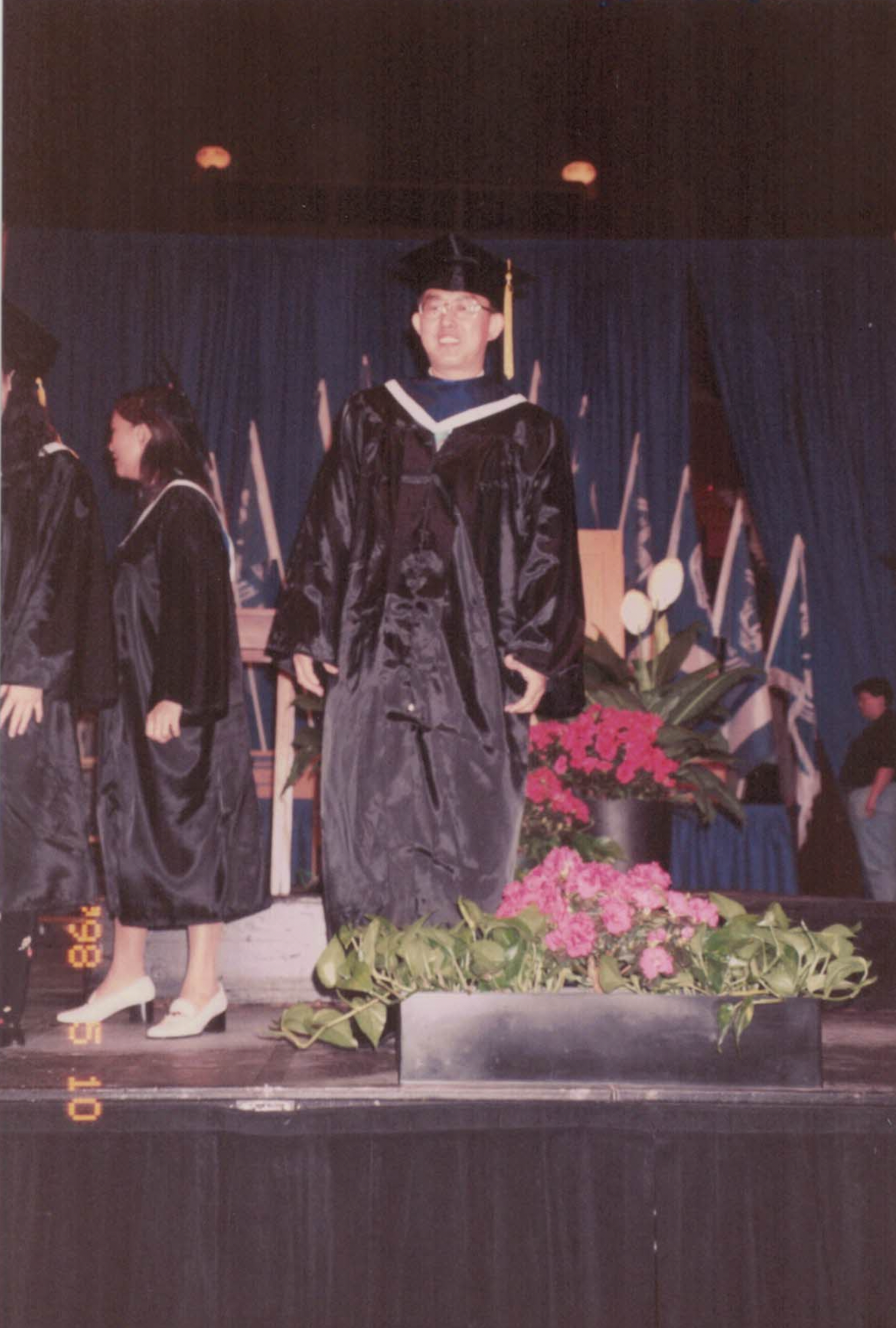 At the graduation ceremony for his last degree in 1998. Photo courtesy of Chong Wan Min.
At the graduation ceremony for his last degree in 1998. Photo courtesy of Chong Wan Min.
Living life to the fullest
When I first heard about Chong, I expected a typical uncle of the coffeeshop-frequenting, Singlish-speaking variety.
And despite my best efforts, I’m still a pretty judgy person. Going back to uni? Probably just to pass the time, lor.
Also, if I were to be honest, my university-age self wouldn’t be super happy to have someone like that as a classmate.
"How do you even make friends with someone like that, anyway," I can imagine 19-year-old me rationalising, as she callously excludes the uncle from her list of potential groupmates.
But I’m surprised at how easily the conversation flows during the interview. Even after I stop recording, we continue to chat: Now that he's graduated, he hopes to repeat his solo hitchhiking feat of 2017, this time in China.
We talk about our plans for the evening, too. He’s going out with his family for a celebratory dinner, while I’m headed home.
He asks where I live, and after a short discussion with his wife, he tells me: “We fetch you home lah.” It’s only at my insistence that home is just a short bus ride away that he relents.
That unexpected kindness chastens me. I start to think if that paiseh-ness I’d imagined an older student would have — that whole fish-out-of-water syndrome — is something borne out of my own self-consciousness.
Since when did learning become a privilege reserved for the young, anyway? Why should anyone feel embarrassed about going back to school?
Chong doesn’t, anyway. Healthy, active, and intelligent, he’s not content to rest on his laurels and depend on his daughter for shelter and sustenance. He won’t even allow himself to fall into obsolescence, the less-spoken-of Singaporean dream — won't let himself be quietly ushered into the aimless comfort of retirement, a purgatory of lazy afternoons and cruise holidays.
Somewhat shamefaced, I ask if he’s faced any difficulty working with his younger classmates. “No lah,” he tells me blithely, to my relief.
In this, at least, he's quite a typical uncle: his easygoing manner makes it easy to make friends with the younger students, who he describes as helpful and cooperative, if a little quieter than what he’s used to.
I ask what it’s like working with them for group projects. His answer is strikingly ordinary: they have meetings at Starbucks, and they compare notes on WhatsApp. It could've come from literally any other uni student, including myself.
The only difference?
“These young people, they not as urgent as me. They relax lah,” he quips.
“For me, I very urgent, I always do in advance. But they always do last minute.”
Top image by Ilyda Chua and courtesy of Chong Wan Min
If you like what you read, follow us on Facebook, Instagram, Twitter and Telegram to get the latest updates.
